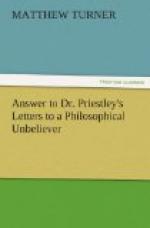29. “A gloom and
melancholy belong more to atheists than to devout
people.”
OBSERVATIONS.
Dr. Priestley will hardly doubt, after this collection from his work that it has at least been read before it is attempted to be answered. It is in the writer’s power to quote the page and line for each assertion, but it would be stuffing this publication with unnecessary references. Dr. Priestley will be able to know what are his own sentiments and what not without recurring to his printed Letters. There has been also another difficulty in classing the several exceptions under the different heads; what is false, what is absurd, and what is inadmissible bordering so nearly on each other. Nice distinctions cannot in such respect be made, but the whole together form the main argument which is to be answered.
The first and principal assertion is, that effects have their adequate cause; it is then added, that the universe is an effect, that it therefore must have a cause, and to this cause in the English language is given the name of God. This proposition is true, provided the universe is an effect, but that is a postulatum without concession and without a proof. This original Being he advances in another place to be that only something which existed uncaused from all eternity, and which could not have been a Being, like a man or a table, incapable of comprehending, itself, for such existences would require another superior Being. But if the universe is not adopted as an effect, if it is taken as existing from all eternity, the universe becomes an intelligent Being, and there or no where is the Deity sought after. Such a Being we may properly speak of and reason upon. The whole is subjected to our sensations and our experience. But of his own uncaused Being Dr. P. says we cannot properly speak. Is not that alone an argument of there being no such thing? His friend Dr. Clarke says, we cannot have an idea of an impossible thing. Now this discovered Deity is allowed to be that of which we can have no idea. So far at least it is allied to the impossible.
As to the argument of cause and effect, the latter certainly implies the former; but when we give the name of effect to any thing, we must be certain it is an effect, for we may be so far mistaken perhaps as to call that an effect which is a cause, at least what is an effect to-day may be a cause to-morrow, as in the instance of generation; for though a son does not beget his father, he too has his offspring in which he may be said to live over again, and if we are to argue only from experience, most probably that alone is the resurrection and the life to come. But if it is contended that our experience relates only to finite causes, or causes incapable of comprehending themselves, it must at the same time be allowed, that all our reasoning is founded only on experience.




